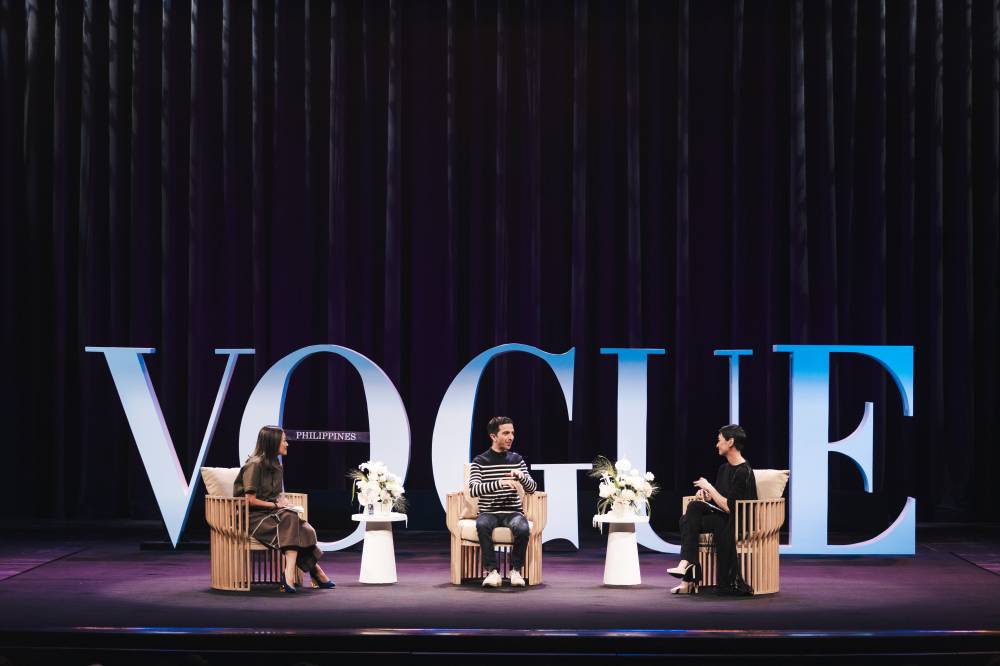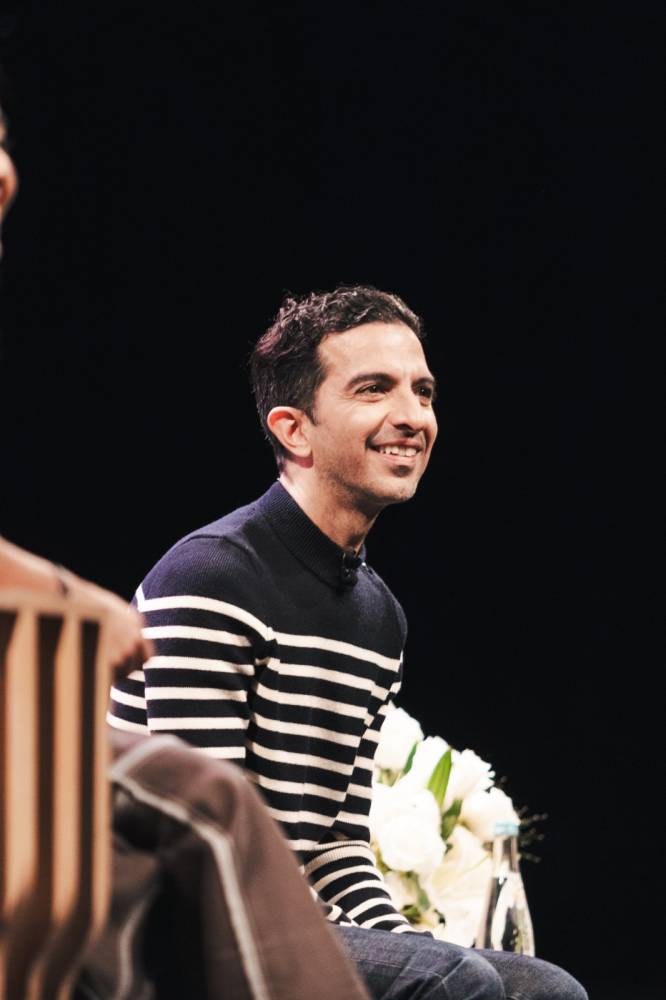‘Your culture is good enough’: Lessons from Imran Amed

When Imran Amed talks, the fashion world listens.
That wasn’t always the case, as the founder, CEO and editor in chief of the London-based online media resource The Business of Fashion (BoF) told a packed Samsung Performing Arts Theater in Circuit, Makati, at the seventh edition of Vogue Philippines’ “Vogue Talks” on Tuesday.
The fashion business authority started with “that little blog” back in 2007, a passion project he pursued from the side of his sofa while working as a consultant after quitting his job at a renowned management consultant firm.
When Amed tried to get his foot in the door as a complete fashion outsider (having grown up in Calgary, Canada—“about as far away from the fashion industry as you can be”—and pursued a very traditional, high-achiever business path), he was told that the industry simply had no use for his skill set.
“There were a lot of barriers,” he said. “I had a group of high-profile clients basically look me in the eye and say, ‘We just don’t need people like you in fashion.’”
After his first attempt at putting up his own fashion-related company lasted all of eight months, he opened up to the public his private blog where he wrote about what he’d learned about the fashion industry through his business-trained lens. Within a few months, he got his first media request from Vogue Korea.
The BoF has since grown into a 100-strong company with multiple revenue streams, and one of the most influential voices in the $2.5-trillion industry, effectively instigating and sustaining a much-needed dialogue between fashion’s creative and business-oriented minds.
Taking big risks
Here are some of the valuable takeaways:
1. You never know what’s going to happen in life.
“There’s nothing worse than waking up in the morning and feeling like you’re working really, really hard, but not feeling any sense of connection or meaning or purpose in your work,” Amed said. While his previous job at McKinsey & Company provided him with incredible training, it left him feeling unfulfilled, as if he was leaving much of his creative self at home.
During a three-month sabbatical, he meditated and made a deal with himself to direct his energy and hard work to something that felt more connected and aligned with his purpose and passion.
These days, Amed couldn’t help but pinch himself sometimes over how making that little decision or taking that big risk turned his life around. “You think you’re starting a company to support designers and, all of a sudden, you’re running a media company.”
2. Businesses must solve a problem to earn the right to exist.
“Think of a problem you can solve before you start a business.” According to Amed, the problem he set out to solve at first was his own deep dissatisfaction with his life. But as it turned out, he was able to address an issue for a bigger community in his personal pursuit of happiness, which is the lack of real dialogue and communication connecting the creative people and the business people in fashion.
Amed recommended taking a good look at an industry and asking what problem one personally connects to. “The problem that you’re solving has to be one that you really care about because, as an entrepreneur, you’re going to be working day and night on this thing. You better damn well care about it.”

Decolonizing minds
3. Your own culture is good enough.
And Amed asserts that there is no need for the Global South to keep looking for validation from the Global North. “The market is big enough. And with the way these economies are growing, they’re going to become even more important.”
He added, “We need to decolonize our minds. Proper decolonization happens when we stop seeking the approval of big Western brands or Western parts of our industry.”
In fact, there is an emerging movement toward microcultures where people are finally finding the confidence to say, “Our culture is good enough. Our design is good enough. And our customers are good enough.”
And while Amed thinks that brands tapping into local culture may see the trend as more of a market opportunity than anything, he doesn’t think it’s a fad for the customers. “More and more of us want to be supporting, wearing and expressing ourselves through designs that reflect who we are.”
There should also be focus on the local community of really talented designers and craftsmen. In India, Amed observed a sort of built-in passing of the baton of local crafts through generations. “One of the biggest risks we have for craft all over the world is that young people aren’t always interested in learning these crafts. One of the most important things that any country needs to do as it pertains to craft is to make sure that it’s being preserved because once the craft is lost, it’s very hard to get it back.”
High-quality journalism
4. There is space for traditional media in the digital age.
It’s no news that the rise of the digital age has been pushing traditional media more and more to the sidelines.
The year 2007, when BoF was founded, has essentially created a “social media storm” that eventually opened up what used to be a one-way-street communication (from brands to consumers) into a free-flow traffic of ideas among various entities. Influencers, celebrities and customers suddenly had a voice in the fast-paced conversation, which saw certain kinds of traditional media losing relevance.
But print still has a following, according to Amed, especially those that have become more collectible—coming out a few times a year to reach a very specific audience.
“In Europe and North America, there are all of these niche publications now that are definitely not selling millions of copies, but they find a really loyal readership,” he said. “What’s nice about niche publications—where there’s a real editor, there’s a real point of view, there’s a really curated perspective—is it’s very differentiated and it feels very, very special. They come out maybe twice a year and people really look forward to them and then they don’t throw them away.
“So I think print media still has relevance. It’s just how how that media is created, what time period it’s created for, and the way the customer engages with it is very, very different from how they engage with something on social media.”
Amed also said that platforms like BoF and traditional media can certainly work together. “In the age we live in, you could have a 200-year-old publication, a 17-year-old blog and a two-year-old creator all exist in the same place. There could be collaborations between those different entities as long as you find an alignment of values.
“For us, those values are high-quality journalism, a global perspective and a subscription-driven business model.”
In fact, he believes that one of the reasons The Financial Times invested in BoF is because “they saw that we still have a very high-quality standard. We focus on quality journalism. We do differentiated journalism, advice and analysis. It just so happens that we weren’t born as a newspaper; we were born as a digital publication.”

Creating ethical fashion
But whatever the platform, Amed said that media has a big role to play in creating a more ethical fashion industry by asking the tough questions, providing insightful analysis, and acknowledging success stories that other people can learn from.
“I think sometimes there’s a lot of coverage in our industry, which is just like public shaming. I don’t believe in that kind of model. I believe in constructive journalism and analysis that helps people,” he said.
Amed referred to the BOF Sustainability Index where they ranked 30 of the biggest fashion companies in the world on various criteria like targets for becoming more sustainable and ethical. It became a sort of report card for these companies to see in which aspects they’re doing well and where they can still improve.
“That’s the role that media can play in driving toward a more ethical industry,” he said. “And if there are very, very tough stories, then we need to feel fearless in the way we report on those stories to make sure that the most important issues in the industry are being addressed openly and honestly.
“Hopefully, BoF is proof that you can build a media company that has credibility and prestige and reach that is not shallow, that goes beyond the surface and the gloss of the fashion industry to something deeper and more substantial.”
















